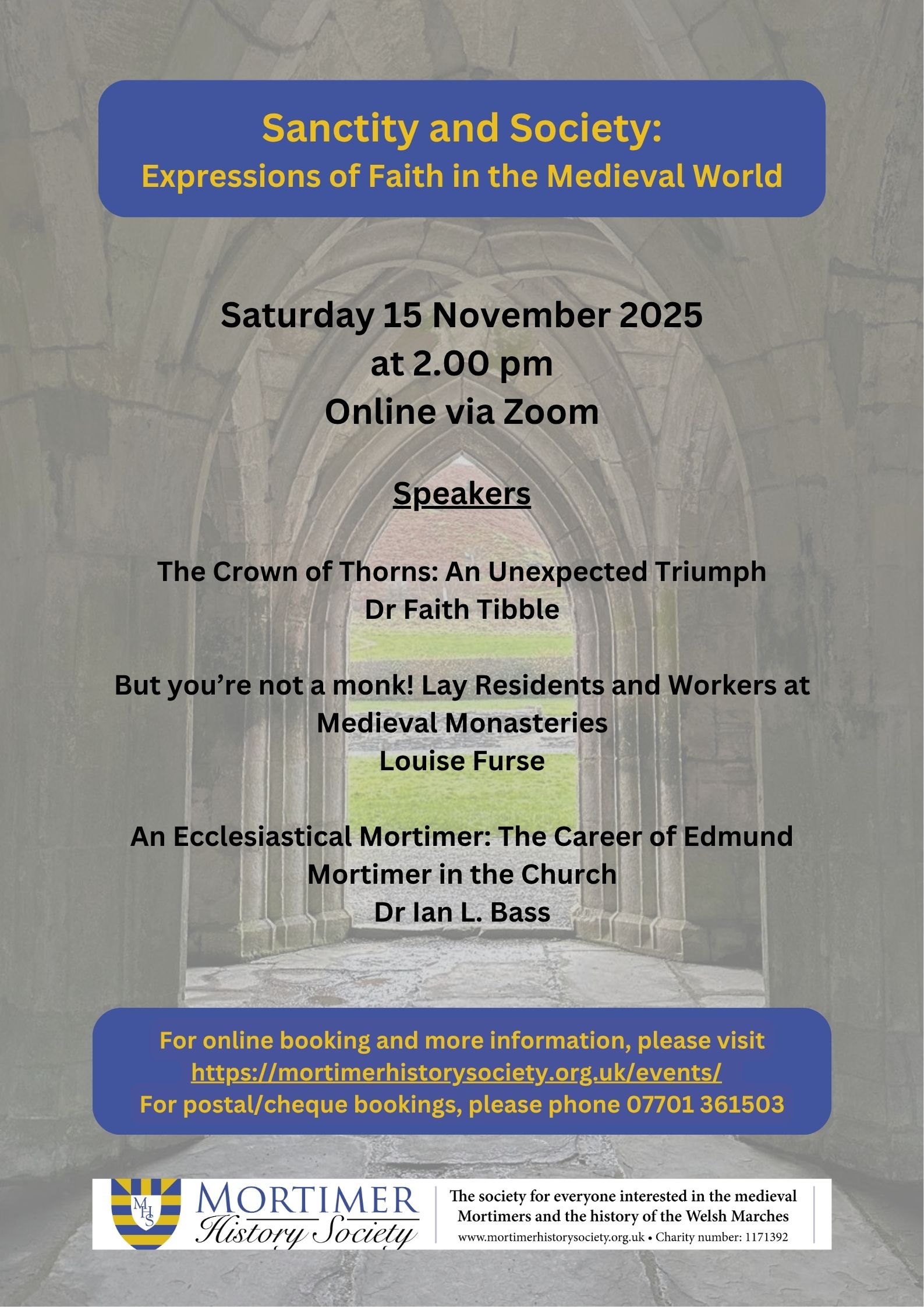Sanctity and Society: Expressions of Faith in the Medieval World
An online half-day conference
Date
Online Conference – Saturday 15th November 2025, 2.00pm to 4.45pm (GMT) (join from 1.45pm)
Venue
Online Only

Programme, Synopses and Biographies
Programme – Saturday 15th November 2025, 2.00pm to 4.45pm (GMT)
13.45 Participants to start to join the conference on Zoom (without video and audio)
14.00 Welcome and Introductions.
14.05 Dr Faith Tibble
The Crown of Thorns: An Unexpected Triumph
14.45 Questions to Dr Faith Tibble
14.55 Louise Furse
But you’re not a monk! Lay Residents and Workers at Medieval Monasteries
15.35 Break
15.50 Questions to Louise Furse
15.55 Dr Ian L. Bass
An Ecclesiastical Mortimer: The Career or Edmund Mortimer in the Church
16.35
Questions to Dr Ian L. Bass and the other speakers
16.45 Close
Tickets
This is an online event only
Saturday 15th November only: members £8.00; non-members £12.00
Online Booking
By telephone
0333 666 3366
(£2 booking fee)
TicketSource problems
If you have problems using TicketSource website, please use the phone number above to discuss issues with TicketSource. If your booking cannot be resolved by this method, please contact Pamela Thom-Rowe on 07701 361503.

Dr Faith Tibble – The Crown of Thorns: An Unexpected Triumph
Dr Faith Tibble will talk about how the ubiquitous imagery of the Crown of Thorns in Passion iconography – commonly symbolising torture, suffering and humiliation – is not at all what it seems, especially for the earliest Christians who first depicted this well-known adornment. This lecture will explode our assumptions about the Crown of Thorns. Her talk will show the audience that the first instance of the Crown of Thorns in Christian art is not what we expect. We find a serene Jesus, gently crowned by a Roman soldier with a leafy wreath. Where are the thorns, the blood, the suffering and humiliation? Perhaps surprisingly, the primary reason lies in the Crown’s military attributes. Particularly the expectations of Jesus as a Messiah, as well as the Roman understanding of triumph.
Dr Faith Tibble is a graduate of Temple and Hafia Universities. A former Latin instructor in Philadelphia, she moved to Israel to study archaeology before gaining her PhD in Medieval Art History. Her recent book, ‘The Crown of Thorns: Humble Gods and Humiliated Kings’, was published by Bloomsbury in March 2025.
.
Louise Furse – But you’re not a monk! Lay Residents and Workers at Medieval Monasteries
This talk will focus on male religious communities in the Marches and discuss examples of lay folk spending time within monastery walls. A surprisingly wide range of people, who were not monks, were part of an abbey’s populace, or briefly came into direct contact with monastic houses. The paper will explore who those lay people were, seeking the understand the reasons for their presence as well as the effect that their proximity had on the professed religious community. By foregrounding the participation of lay people, the speaker intends to present a more nuanced picture of the diversity of the lived experience within the medieval monastic precinct.
Louise Furse Having studied Theology as an undergraduate at Oxford University, Louise now specialises in medieval religious history. She gained a Master’s degree in Medieval Studies at Swansea University, which included a dissertation on Yveta of Jerusalem, abbess of the religious community at Bethany in the Latin East during the twelfth century. Louise is currently a Senior Teaching Assistant and PhD researcher at Swansea. She is under the supervision of Processor Daniel Power and Dr Emma Cavell and has been awarded a Swansea University Research Excellence Scholarship. Her research topic concerns the presence of lay people within monastic precincts in England and Wales during the Central Middle Ages.
Dr Ian L. Bass – An Ecclesiastical Mortimer: The Career or Edmund Mortimer in the Church
The life of Edmund Mortimer (d. 1304) is one of two halves. As a second son, he was not destined to inherit the lordship of Wigmore and so forged a career in the Church. Following his brother’s death in 1274 Edmund’s star changed and in 1282 when his father, Roger, died, Edmund became lord. However, despite the fact that Edmund spent almost as much time in the Church as he did lord of Wigmore, modern accounts of his life have focused primarily on the latter, scarcely acknowledging, let alone exploring, his early life as an ecclesiastic. Yet, this only offers half a story. In this paper, Edmund’s ecclesiastical career is revealed and is one not without controversy: even being threatened with excommunication twice. This paper demonstrates the rich potential to study lesser-known members of the Mortimers and their role in the Church.
Dr Ian L. Bass received his PhD from the Manchester Metropolitan University in March 2020 and is an independent scholar. He has published widely on the posthumous cult of St Thomas de Cantilupe, bishop of Hereford (1275–82, canonized 1320). He was the winner of the inaugural MHS Essay Prize in 2016 and again in 2023. He is currently preparing a text and translation of the miracles of St Thomas of Hereford, as well as editing his doctoral thesis for eventual publication as a monograph.
